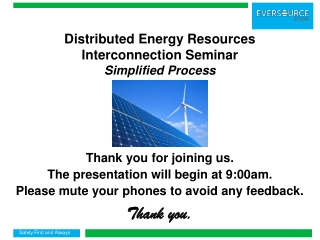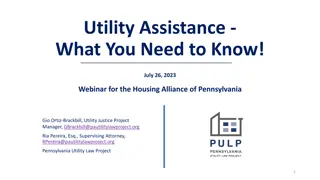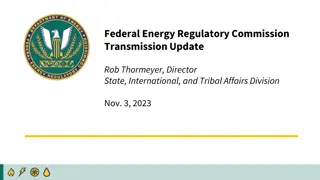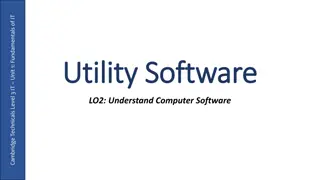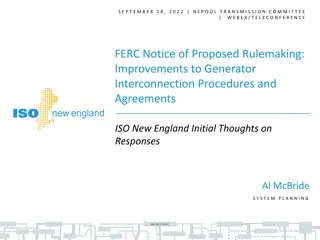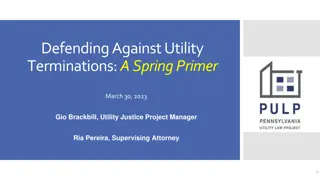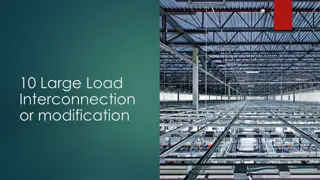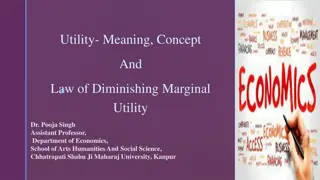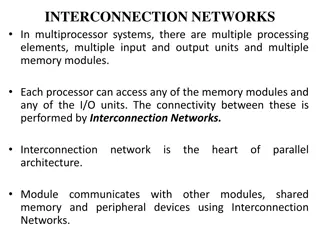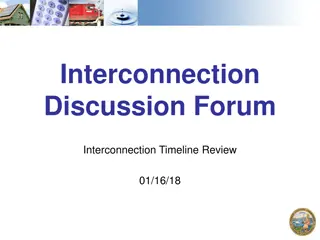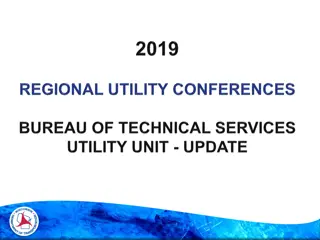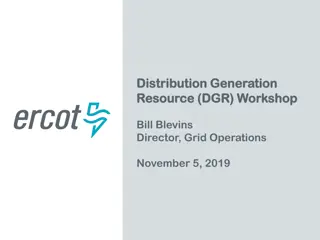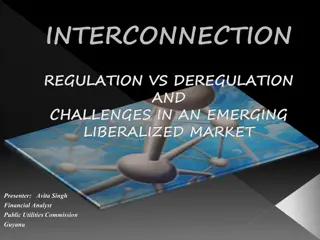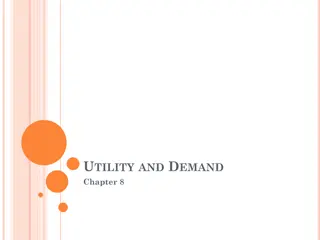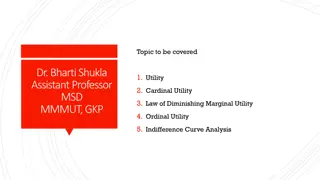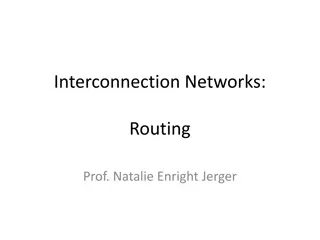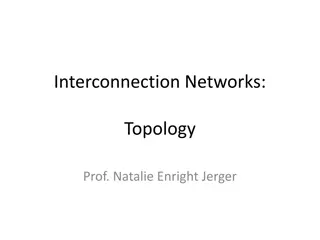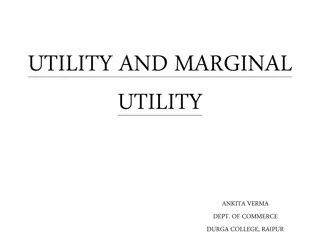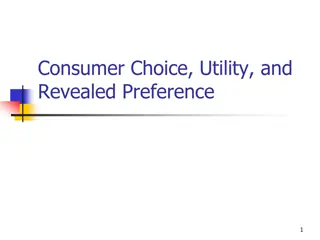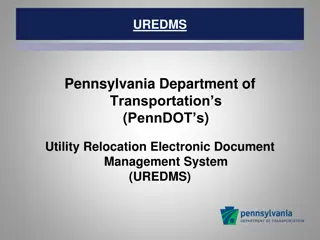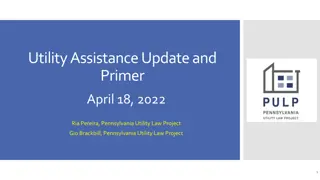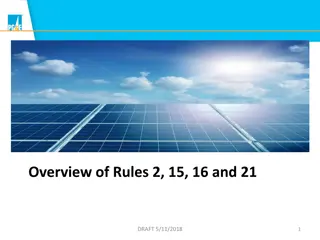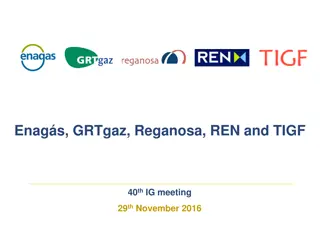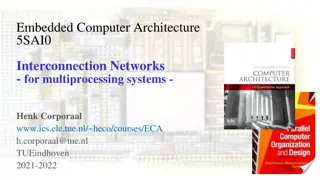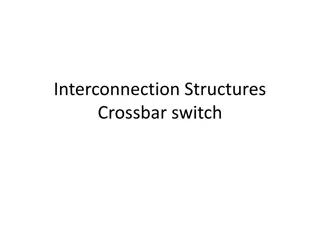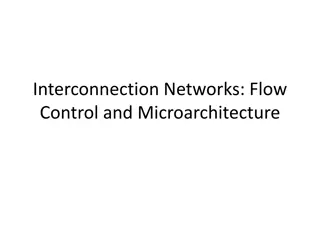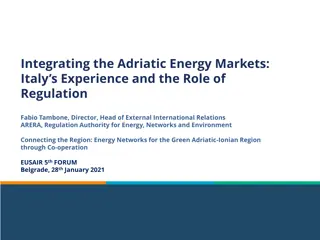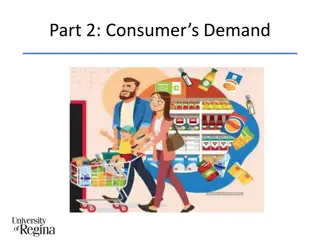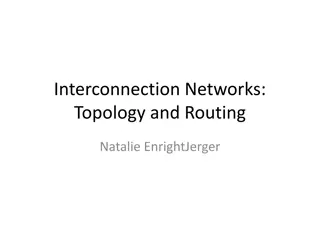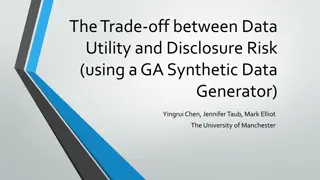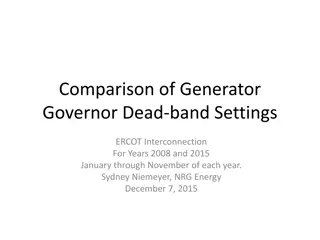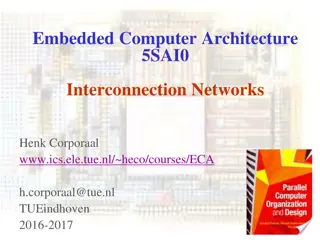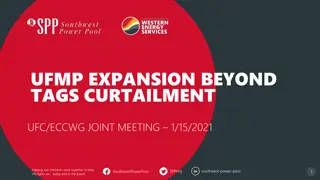Safety First and Always: DG Interconnection Seminar Process
Learn how to ensure safety while connecting Distributed Energy Resources. Understand the simplified process for interconnection, including key steps and safety precautions. Join us to enhance your knowledge and protect yourself and your team.
0 views • 26 slides
Understanding Utility Assistance and Support in Pennsylvania
Gain insights into utility assistance initiatives in Pennsylvania through the perspective of the Pennsylvania Utility Law Project. Topics covered include regulated vs. unregulated utilities, affordability issues, tenant protections, and the impact of utility insecurity on various aspects of life. Di
1 views • 32 slides
Federal Energy Regulatory Commission Transmission Update - Nov. 3, 2023
FERC, led by Director Rob Thormeyer, regulates natural gas wholesale facilities, interstate pipelines, onshore LNG facilities, wholesale electric market rates, and more. The Commission consists of five appointed Commissioners overseeing key initiatives like transmission planning proposals and interc
0 views • 14 slides
Understanding Utility Software in IT Systems
Utility software plays a crucial role in maintaining and configuring computer systems. This unit focuses on key utility software types like defragmentation, backups, compression, anti-virus, and encryption. Understanding the purpose, features, advantages, and disadvantages of utility software is ess
0 views • 9 slides
Improvements to Generator Interconnection Procedures: ISO New England Response
FERC's Notice of Proposed Rulemaking seeks to enhance generator interconnection procedures to address queue backlogs and promote fairness. ISO New England outlines expansive changes, including a first-ready, first-served process, and discusses trade-offs in project viability and completion expectati
0 views • 36 slides
Proposed Enhancements for Generator Interconnection Process
Enhancements proposed for the generator interconnection process include creating a distinction between large and small generators, establishing tracking processes for small generators, and modifying existing sub-sections to incorporate small and large generators in Sections 5 and 6. The goal is to s
1 views • 12 slides
Defending Against Utility Terminations: A Spring Primer
The Pennsylvania Utility Law Project (PULP) provides assistance and advice on residential utility and energy matters for low-income consumers, aiming to ensure equitable access to affordable utility services. PULP offers direct representation, utility assistance program design, and technical assista
0 views • 47 slides
Large Load Interconnection and Modification Guidelines
Ensure new or modified large loads are interconnected in a manner that maintains system reliability and complies with relevant standards and protocols. General provisions, interconnection agreements, procedures, and study processes are outlined to facilitate smooth integration within the ERCOT syste
0 views • 22 slides
Understanding Utility: Marginal vs. Total Utility
Utility in economics is the satisfaction derived from consuming goods or services. Marginal utility measures the change in total utility as consumption increases, whereas total utility is the sum of satisfaction obtained from consuming different units of a commodity. Consumers aim to maximize total
2 views • 11 slides
Understanding Utility: Meaning, Concept, and Law of Diminishing Marginal Utility
Utility is the satisfaction or well-being a consumer derives from consuming goods or services. Total utility is the sum of satisfactions, while marginal utility is the additional satisfaction from one more unit consumed. Utility can be measured and ranked but not numerically. The Law of Diminishing
3 views • 9 slides
Understanding Interconnection Networks in Multiprocessor Systems
Interconnection networks are essential in multiprocessor systems, linking processing elements, memory modules, and I/O units. They enable data exchange between processors and memory units, determining system performance. Fully connected interconnection networks offer high reliability but require ext
1 views • 19 slides
Interconnection Discussion Forum Timeline Review - 01/16/18
Interconnection Discussion Forum held on 01/16/18 discussed safety measures, meeting objectives, and timeline objectives. The agenda covered topics like submitting applications, engineering reviews, design, construction, and commissioning. Safety protocols for emergencies like earthquake and evacuat
0 views • 14 slides
Discover Rwanda: African Peering and Interconnection Forum 2020
Rwanda, the host of the African Peering and Interconnection Forum 2020, offers a remarkable blend of stunning scenery, friendly people, and economic development. With a focus on internet and ICT, the country boasts 4G LTE coverage, a growing MICE industry, investment opportunities, and accessibility
1 views • 8 slides
WisDOT Utility Coordination Efforts for Statewide Projects
WisDOT is testing new processes using DocuSign for utility coordination in statewide projects, aiming to streamline procedures and reduce over-processing. Shane Smith and Dylan Gates are leading the testing phase with utility companies to gather feedback and improve the system. The team's goal is to
5 views • 20 slides
Evolution of MISO Interconnection Process: Enhancing Certainty and Efficiency
The MISO Interconnection Process has evolved over the years, reflecting improved certainty and efficiency. From historical trends to current statistics, the process highlights challenges, adjustments, and next steps to address issues like project dropouts, uncertainty in timing and costs, and entry
0 views • 11 slides
DGR Interconnection Conditions Overview
Interconnection requirements for Distributed Generation Resources (DGR) include coordination with Distribution Service Providers (DSP), confirmation of operational limitations, and compliance with ERCOT regulations. These conditions ensure safe and efficient integration of DGRs into the electrical g
0 views • 19 slides
Interconnection Discussion Forum Projects Update
Update on interconnection activities, projects over 1MW, and themes discussed in the forum. Includes meeting objectives, agenda topics, inquiry themes, and PG&E interconnection updates on process changes and completed/planned actions.
0 views • 15 slides
Updates on Generator Interconnection Procedures and Agreements Reform
ISO-NE is implementing further compliance reforms in response to FERC Order No. 845 regarding Generator Interconnection Procedures and Agreements. This includes proposed tariff language updates and discussions on surplus interconnection services. The changes aim to enhance the efficiency and effecti
0 views • 14 slides
Interconnection Regulation vs. Deregulation Challenges in an Emerging Liberalized Market
Interconnection between telecommunication networks and services plays a vital role in enhancing value for subscribers and facilitating the provision of a wide range of services. Regulation of interconnection is essential to protect competition, achieve social objectives, manage scarce resources, ens
0 views • 22 slides
Understanding Consumer Choices and Utility Maximization
Exploring how consumers make consumption decisions based on utility theory, marginal utility, and preferences. Analyzing Lisa's consumption possibilities, total utility, and marginal utility to illustrate economic concepts. Discussing the utility-maximizing rule for optimal decision-making in spendi
0 views • 22 slides
Understanding Utility Theory in Economics
Utility theory in economics explores the concept of utility, which refers to the satisfaction or want-satisfying capacity a commodity provides to consumers. It is subjective, relative, and can vary among individuals. Cardinal utility analysis quantifies utility in numbers, while total utility and ma
3 views • 13 slides
Global Energy Interconnection and Power Grid Interconnections
Global Energy Interconnection (GEI) envisions globally interconnected power grids supporting clean, renewable energy transmission worldwide. Ultra-high voltage technology enables efficient long-distance power transmission. The concept originated in the 20th century and was endorsed by the United Nat
1 views • 40 slides
Understanding Routing in Interconnection Networks
Routing in interconnection networks involves distributing traffic evenly among paths to avoid hotspots and contention, aiming for balanced throughput. Various routing algorithms, such as greedy, uniform random, and adaptive, are discussed with examples highlighting their impact on network performanc
2 views • 38 slides
Understanding Interconnection Networks Topology
Exploring the topology of interconnection networks helps determine the arrangement of channels and nodes, impacting network cost, performance, latency, energy consumption, and complexity of implementation. Abstract metrics such as degree, hop count, and network diameter play crucial roles in evaluat
1 views • 56 slides
Understanding Utility and Marginal Utility in Economics
Utility refers to the satisfaction a consumer receives from consuming commodities. It is a subjective concept that can be measured through cardinal or ordinal approaches. Cardinal approach involves measuring utility numerically, while ordinal approach orders levels of satisfaction based on utility.
0 views • 16 slides
Understanding Consumer Choice and Utility Theory
Explore the concepts of consumer choice, utility, and revealed preference in economics. Learn how utility functions help us rank the desirability of consuming different bundles of goods. Discover the mathematical representation of utility and see examples of representing utility in terms of goods co
0 views • 69 slides
PennDOT UREDMS - Utility Relocation Electronic Document Management System
PennDOT's UREDMS (Utility Relocation Electronic Document Management System) is an electronic document management system used for utility relocations. It functions as a virtual filing cabinet, allowing for easier search, faster retrieval, and better revision control of important documents. The system
1 views • 15 slides
Utility Assistance Update and Primer - PULP Focus on Low-Income Residential Utility in Pennsylvania
Today's webinar presented by Pennsylvania Utility Law Project (PULP) focused on LIHEAP programs, tools for preventing termination, and special protections for utility customers. It covered the Winter Moratorium ending, LIHEAP basics, eligibility criteria for cash grants, and more to assist low-incom
0 views • 50 slides
Understanding Rules 2, 15, 16, and 21 in Utility Interconnection
This draft provides an overview of rules governing utility interconnection, focusing on Rules 2, 15, 16, and 21. It outlines meeting and learning objectives related to policy questions, mitigation costs, and interconnection timelines. Definitions of Line Extension (Rule 15) and Service Extension (Ru
0 views • 46 slides
Gas Interconnection Agreements and Balancing Implementation Insights
Gas industry stakeholders Enags, GRTgaz, Reganosa, REN, and TIGF collaborated on various public consultations and discussed the implementation of Balancing Network Codes. Key topics include interconnection agreements, exceptional event situations, local products for balancing services, and the publi
0 views • 13 slides
Interconnection Networks in Multiprocessing Systems Overview
Explore the intricacies of interconnection networks for multiprocessing systems in Embedded Computer Architecture, covering connecting processors, topologies, routing, deadlock, switching, and performance metrics like bandwidth and latency. Delve into various network types, such as on-chip networks
0 views • 33 slides
Understanding Crossbar Switch Interconnection Structures
Interconnection structures like crossbar switches consist of crosspoints that control the pathways between processors and memory modules. The switch determines the transfer path and resolves access requests on a priority basis. Through multiplexers and arbitration logic, crossbar switches enable sim
0 views • 6 slides
Understanding Interconnection Networks, Flow Control, and Microarchitecture
Interconnection networks play a crucial role in determining the flow control and routing paths within a network, impacting throughput and latency. Different switching techniques like circuit-switching, packet-based, and flit-based control the allocation of resources at various granularities. Circuit
0 views • 41 slides
Integrating Adriatic Energy Markets: Italy's Regulatory Perspective
The presentation delves into Italy's experience in integrating Adriatic energy markets and the crucial role of regulation by ARERA. Exploring the promotion of markets integration, the talk highlights regulatory convergence in practice through projects like the MONITA interconnection. Italy's Regulat
0 views • 17 slides
Understanding Consumer Demand: From Utility Theory to Behavior in the Marketplace
We delve into the relationship between utility theory and consumer demand, exploring how individuals' tastes, preferences, and budget constraints influence their choices. Through examples like Neal's decision between snowboarding and jazz, we see how utility translates into demand curves, guiding co
0 views • 17 slides
Understanding Interconnection Networks: Topology and Routing
Interconnection networks play a crucial role in determining the arrangement of channels and nodes within a network, similar to a road map guiding traffic flow. Topology overview defines the network structure, while abstract metrics help evaluate performance and cost. Latency and throughput are key f
0 views • 49 slides
Understanding the Trade-off between Data Utility and Disclosure Risk
This study explores the balance between data utility and disclosure risk using a GA synthetic data generator. The authors delve into measuring utility and risk, emphasizing structured categorical data. They define synthetic data, discuss utility assessment methods, and outline how to measure data ut
0 views • 30 slides
Comparison of Generator Governor Dead-band Settings in ERCOT Interconnection
This report compares the generator governor dead-band settings in the ERCOT Interconnection for the years 2008 and 2015 from January to November. It outlines the changes in the dead-band settings over the years, including the requirements for proportional response, improvements in primary frequency
0 views • 17 slides
Understanding Interconnection Networks in Embedded Computer Architecture
Explore the intricacies of interconnection networks in embedded computer architecture, covering topics such as connecting multiple processors, topologies, routing, deadlock, switching, and performance considerations. Learn about parallel computer systems, cache interconnections, network-on-chip, sha
0 views • 43 slides
Enhancing Western Interconnection Congestion Management
Addressing congestion management challenges within the Western Interconnection through the Western Interconnection Unscheduled Flow Mitigation Plan (WIUFMP). The plan focuses on curtailing tagged energy transfers during critical events and optimizing generation-to-load impact calculations, aiming to
0 views • 23 slides
